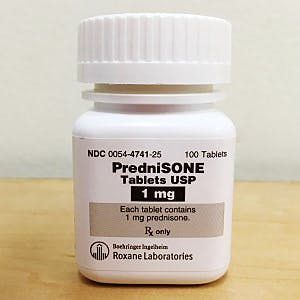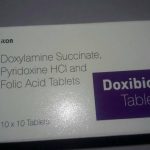Prednisone: Uses, Benefits, Side effects, Interactions

Prednisone is in a class of medications called corticosteroids. It works to treat patients with low levels of corticosteroids by replacing steroids that are normally produced naturally by the body. It works to treat other conditions by reducing swelling and redness and by changing the way the immune system works. Prednisone is not a common drug of abuse. Although obtaining it does require a prescription, it is not listed as a controlled substance by the United States Drug Enforcement Administration (DEA).
Prednisone is used alone or with other medications to treat the symptoms of low corticosteroid levels (lack of certain substances that are usually produced by the body and are needed for normal body functioning). Prednisone is also used to treat other conditions in patients with normal corticosteroid levels.
These conditions include certain types of arthritis; severe allergic reactions; multiple sclerosis (a disease in which the nerves do not function properly); lupus (a disease in which the body attacks many of its own organs); and certain conditions that affect the lungs, skin, eyes, kidneys blood, thyroid, stomach, and intestines. Prednisone is also sometimes used to treat the symptoms of certain types of cancer.
When should you take prednisone?
Prednisone comes as a tablet, delayed-release tablet, as a solution (liquid), and as a concentrated solution to take by mouth. Prednisone is usually taken with food one to four times a day or once every other day. Your doctor will probably tell you to take your dose(s) of prednisone at certain time(s) of day every day. Your personal dosing schedule will depend on your condition and on how you respond to treatment. Follow the directions on your prescription label carefully, and ask your doctor or pharmacist to explain any part you do not understand. Take prednisone exactly as directed. Do not take more or less of it or take it more often or for a longer period of time than prescribed by your doctor.
If you are taking the concentrated solution, use the specially marked dropper that comes with the medication to measure your dose. You may mix the concentrated solution with juice, other flavored liquids, or soft foods such as applesauce.
Swallow the delayed-release tablet whole; do not chew or crush it.
Your doctor may change your dose of prednisone often during your treatment to be sure that you are always taking the lowest dose that works for you. Your doctor may also need to change your dose if you experience unusual stress on your body such as surgery, illness, infection, or a severe asthma attack. Tell your doctor if your symptoms improve or get worse or if you get sick or have any changes in your health during your treatment.
If you are taking prednisone to treat a long-lasting disease, the medication may help control your condition but will not cure it. Continue to take prednisone even if you feel well. Do not stop taking prednisone without talking to your doctor. If you suddenly stop taking prednisone, your body may not have enough natural steroids to function normally. This may cause symptoms such as extreme tiredness, weakness, slowed movements, upset stomach, weight loss, changes in skin color, sores in the mouth, and craving for salt. Call your doctor if you experience these or other unusual symptoms while you are taking decreasing doses of prednisone or after you stop taking the medication.
What side effects can this medication cause?
Prednisone may cause side effects. Tell your doctor if any of these symptoms are severe or do not go away:
- headache
- dizziness
- difficulty falling asleep or staying asleep
- inappropriate happiness
- extreme changes in mood
- changes in personality
- bulging eyes
- acne
- thin, fragile skin
- red or purple blotches or lines under the skin
- slowed healing of cuts and bruises
- increased hair growth
- changes in the way fat is spread around the body
- extreme tiredness
- weak muscles
- irregular or absent menstrual periods
- decreased sexual desire
- heartburn
- increased sweating
Some side effects can be serious. If you experience any of the following symptoms, call your doctor immediately:
- vision problems
- eye pain, redness, or tearing
- sore throat, fever, chills, cough, or other signs of infection
- seizures
- depression
- loss of contact with reality
- confusion
- muscle twitching or tightening
- shaking of the hands that you cannot control
- numbness, burning, or tingling in the face, arms, legs, feet, or hands
- upset stomach
- vomiting
- lightheadedness
- irregular heartbeat
- sudden weight gain
- shortness of breath, especially during the night
- dry, hacking cough
- swelling or pain in the stomach
- swelling of the eyes, face, lips, tongue, throat, arms, hands, feet, ankles, or lower legs
- difficulty breathing or swallowing
- rash
- hives
- itching
Prednisone may slow growth and development in children. Your child’s doctor will watch his or her growth carefully. Talk to your child’s doctor about the risks of giving prednisone to your child.
Prednisone may increase the risk that you will develop osteoporosis. Talk to your doctor about the risks of taking prednisone and about things that you can do to decrease the chance that you will develop osteoporosis.
Some patients who took prednisone or similar medications developed a type of cancer called Kaposi’s sarcoma. Talk to your doctor about the risks of taking prednisone.
Prednisone may cause other side effects. Call your doctor if you have any unusual problems while you are taking this medication.
If you experience a serious side effect, you or your doctor may send a report to the Food and Drug Administration’s (FDA) MedWatch Adverse Event Reporting program online (http://www.fda.gov/Safety/MedWatch) or by phone (1-800-332-1088).
What drugs can interact with prednisone?
Prednisone oral tablet can interact with other medications, vitamins, or herbs you may be taking. An interaction is when a substance changes the way a drug works. This can be harmful or prevent the drug from working well.
Tell your doctor and pharmacist what prescription and nonprescription medications, vitamins, and nutritional supplements you are taking or plan to take. Be sure to mention any of the following: amiodarone (Pacerone); anticoagulants (‘blood thinners’) such as warfarin (Coumadin); certain antifungals such as fluconazole (Diflucan), itraconazole (Sporanox), ketoconazole (Nizoral) and voriconazole (Vfend);aprepitant (Emend); aspirin; carbamazepine (Carbatrol, Epitol, Tegretol); cimetidine (Tagamet); clarithromycin (Biaxin, in Prevpak); cyclosporine (Neoral, Sandimmune); delavirdine (Rescriptor); diltiazem (Cardizem, Dilacor, Tiazac, others); dexamethasone (Decadron, Dexpak); diuretics (‘water pills’); efavirenz (Sustiva); fluoxetine (Prozac, Sarafem); fluvoxamine (Luvox); griseofulvin (Fulvicin, Grifulvin, Gris-PEG); HIV protease inhibitors including atazanavir (Reyataz), indinavir (Crixivan), lopinavir (in Kaletra), nelfinavir (Viracept), ritonavir (Norvir, in Kaletra), and saquinavir (Fortovase, Invirase); hormonal contraceptives (birth control pills, patches, rings, implants, and injections); lovastatin (Altocor, Mevacor); medications for diabetes; nefazodone; nevirapine (Viramune); phenobarbital; phenytoin (Dilantin, Phenytek); rifabutin (Mycobutin), rifampin (Rifadin, Rimactane, in Rifamate); sertraline (Zoloft); troleandomycin (TAO); verapamil (Calan, Covera, Isoptin, Verelan); and zafirlukast (Accolate).Your doctor may need to change the doses of your medications or monitor you carefully for side effects.





